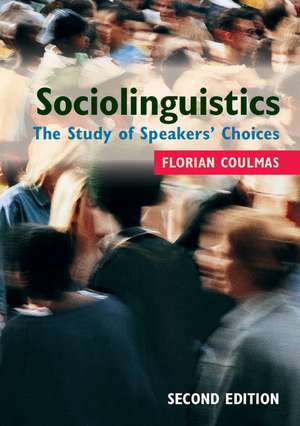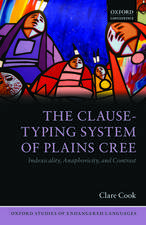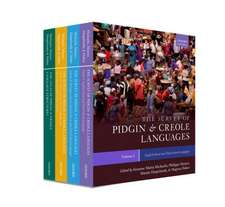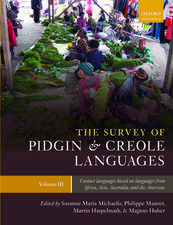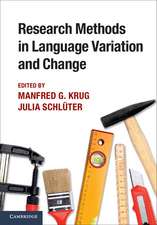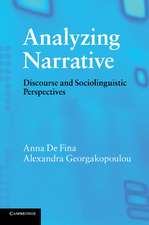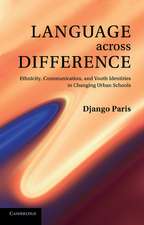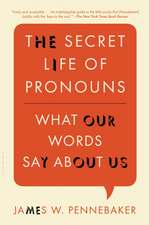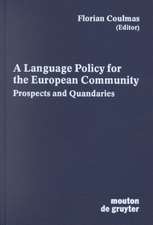Sociolinguistics: The Study of Speakers' Choices
Autor Florian Coulmasen Limba Engleză Paperback – 14 aug 2013
| Toate formatele și edițiile | Preț | Express |
|---|---|---|
| Paperback (1) | 370.82 lei 6-8 săpt. | |
| Cambridge University Press – 14 aug 2013 | 370.82 lei 6-8 săpt. | |
| Hardback (1) | 755.43 lei 6-8 săpt. | |
| Cambridge University Press – 14 aug 2013 | 755.43 lei 6-8 săpt. |
Preț: 370.82 lei
Nou
Puncte Express: 556
Preț estimativ în valută:
70.95€ • 74.28$ • 58.71£
70.95€ • 74.28$ • 58.71£
Carte tipărită la comandă
Livrare economică 05-19 aprilie
Preluare comenzi: 021 569.72.76
Specificații
ISBN-13: 9781107675568
ISBN-10: 1107675561
Pagini: 318
Ilustrații: 33 b/w illus. 2 maps 20 tables
Dimensiuni: 173 x 246 x 14 mm
Greutate: 0.64 kg
Ediția:Revizuită
Editura: Cambridge University Press
Colecția Cambridge University Press
Locul publicării:New York, United States
ISBN-10: 1107675561
Pagini: 318
Ilustrații: 33 b/w illus. 2 maps 20 tables
Dimensiuni: 173 x 246 x 14 mm
Greutate: 0.64 kg
Ediția:Revizuită
Editura: Cambridge University Press
Colecția Cambridge University Press
Locul publicării:New York, United States
Cuprins
1. Introduction: notions of language; Part I. Micro-choices: 2. Standard and dialect: social stratification as a factor of linguistic choice; 3. Gendered speech: sex as a factor of linguistic choice; 4. Communicating across generations: age as a factor of linguistic choice; 5. Choice and change; 6. Politeness: cultural dimensions of linguistic choice; Part II. Macro-choices: 7. Code-switching: linguistic choices across language boundaries; 8. Diglossia and bilingualism: functional restrictions on language choice; 9. Language spread, shift and maintenance: how groups choose their language; 10. Language and identity: individual, social, national; 11. Language planning: communication demands, public choice, utility; 12. Select letters: a major divide; 13. The language of choice; 14. Research ethics.
Recenzii
'To write a great introductory text you have to make a statement about fundamental issues. Here, the notion of choice bridges the gap between micro and macrosociolinguistics and brings both cohesion and edge to the book.' Frans Gregersen, The Lanchart Centre, University of Copenhagen
'This is the book I'd [choose] to introduce students to the fast developing field of sociolinguistics, for it combines clear explanations with intriguing examples.' Bernard Spolsky, Professor Emeritus, Bar-Ilan University
'A highly original synthesis of decades of sociolinguistics research, and an agenda setter, around the key notion of 'choice', for many years to come.' Li Wei, Birkbeck, University of London
'… a well-written compendium, providing readers with a concise, yet elaborate description of sociolinguistic research … The topics addressed are broad and wide-sweeping, showing the diversity of sociolinguistic research while at the same time making each arena seem accessible to the novice researcher. It was a pleasant read, informative, and extremely useful. … an excellent book.' Brad Miller, Journal of Sociolinguistics
'This is the book I'd [choose] to introduce students to the fast developing field of sociolinguistics, for it combines clear explanations with intriguing examples.' Bernard Spolsky, Professor Emeritus, Bar-Ilan University
'A highly original synthesis of decades of sociolinguistics research, and an agenda setter, around the key notion of 'choice', for many years to come.' Li Wei, Birkbeck, University of London
'… a well-written compendium, providing readers with a concise, yet elaborate description of sociolinguistic research … The topics addressed are broad and wide-sweeping, showing the diversity of sociolinguistic research while at the same time making each arena seem accessible to the novice researcher. It was a pleasant read, informative, and extremely useful. … an excellent book.' Brad Miller, Journal of Sociolinguistics
Notă biografică
Descriere
This new and updated textbook gives students a coherent view of the complex interaction of language and society.
